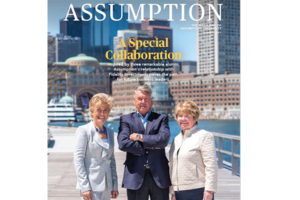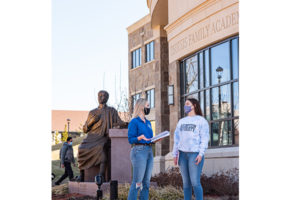
On the morning of March 20, the day our initial transition into the strange world of temporary remote learning created by the COVID Pandemic began, I received an email from a student who had watched Schindler’s List, one of my frequent recommendations to students when we are learning about World War II and the Holocaust. I was glad to see her message and found myself inspired.
The global pandemic had already prompted me to think back to my first reading of Thomas Mann’s classic novel, The Magic Mountain, during a summer break from college. The novel was a constant companion throughout that summer and probably played a role in helping me to discover my vocation as an intellectual and cultural historian of Central Europe. Thanks to my student’s email, I felt compelled to write to my former history professor and then reached out to some Assumption history alumni, inviting them to join me for a virtual book club.
Why on earth would anyone, at this moment in time, want to read a book about a group of Europeans with tuberculosis convalescing in Davos, Switzerland? The Magic Mountain is a book that celebrates the interiority of a quarantine. It demonstrates how much productive thought and growth can happen in the midst of social isolation. I pro- posed that perhaps this is a book that might speak to us at this current crossroads in history and shed some insight into our present moment. Nearly every former student was eager to participate. Throughout the summer, the Magic Mountaineers met virtually biweekly, sharing questions that sparked and encouraged thoughtful discussion. More often than not, we found things that seemed useful in thinking about our current circumstances, other times we focused on things that make Thomas Mann’s times so very different from our own, and of course we evaluated the characters. While we did focus on the writing and its meaning, we also tried to confront the book historically. Mann had initially intended the book to be a short story — a light and funny antidote to his heavy and depressing novella, Death in Venice.
The inspiration for the story arose from a visit that Mann paid to his wife when she was recovering from tuberculosis prior to World War I. As Mann picked the project back up after the Great War, he began to think about it differently. In the aftermath of the conflict, the story grew to become a grand metaphor for what Europe had been through and discovered about itself.
Because the book deals with large and timeless questions, it is ideally designed for Assumption graduates. Because all of our students gain such a solid grounding in the liberal arts, they are ideally prepared to grapple with and follow the existential questions that form the basis of Mann’s inquiry — questions such as who we are, why we are here, and what the purpose is of our existence. It has been incredibly rewarding to reconnect with students around common interests and to see how much they have changed, as well as how they are putting their educations to use.
Here’s to making the most of these very hard times — and keep climbing (even if it’s only metaphorical)!


